Related Research Articles
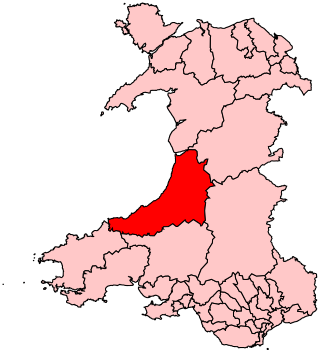
Ceredigion was a parliamentary constituency represented in the House of Commons of the UK Parliament. Created in 1536, the franchise expanded in the late 19th century and on the enfranchisement of women. Its boundaries remained virtually unchanged until 1983. From 1536 until 1885 the area had two seats : a county constituency (Cardiganshire) comprising the rural areas, the other the borough constituency known as the Cardigan District of Boroughs comprising a few separate towns; in 1885 the latter was abolished, its towns and electors incorporated into the former, reduced to one MP. The towns which comprised the Boroughs varied slightly over this long period, but primarily consisted of Cardigan, Aberystwyth, Lampeter and Adpar, the latter now a suburb of Newcastle Emlyn across the Teifi, in Carmarthenshire.
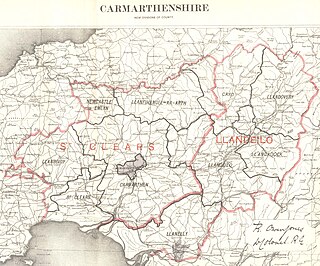
East Carmarthenshire was a county constituency in Carmarthenshire, Wales. It returned one Member of Parliament (MP) to the House of Commons of the Parliament of the United Kingdom, elected by the first past the post voting system.

West Carmarthenshire was a parliamentary constituency in Wales which returned one Member of Parliament (MP) to the House of Commons of the Parliament of the United Kingdom.
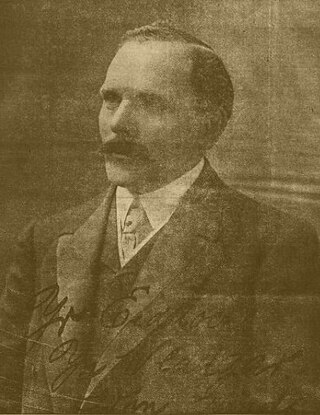
John Hinds was a Welsh businessman and politician. At the December 1910 general election Hinds was chosen as the Liberal candidate for the seat of West Carmarthenshire, holding the seat until its abolition in 1918.
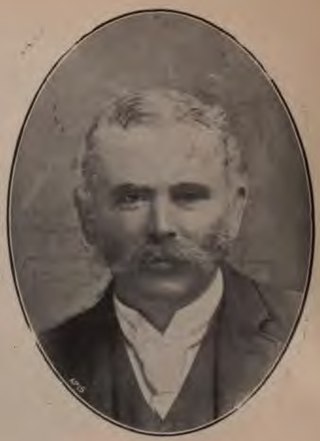
Abel Thomas was a Welsh Liberal politician and lawyer.
David Pugh was a Welsh landowner and Liberal Party politician who sat in the House of Commons from 1857 until 1868 and again from 1885 until his death in 1890.

John Lloyd Morgan was Liberal Party Member of Parliament (MP) for West Carmarthenshire from 1889 to 1910.
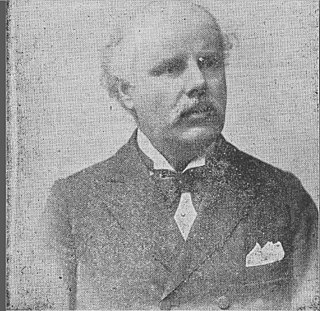
Alfred Davies, was a British Liberal Party politician and businessman. Davies founded the British freight forwarding company Davies Turner in 1870 which claimed in 2013 to be the largest independent freight forwarding company operating in Great Britain.
The first election to the Cardiganshre County Council was held in January 1889. It was followed by the 1892 election. The county was divided into numerous single member wards with two councillors elected to represent Cardigan, Lampeter, New Quay and Llandysul, and four to represent the town of Aberystwyth. 37 Liberals, 10 Conservatives and 1 Unionist were returned.
The second election for the Cardiganshire County Council took place in March 1892. It was preceded by the inaugural 1889 election and followed by the 1895 election.
The first election to the Carmarthenshire County Council was held in January 1889. It was followed by the 1892 election.
The second election to the Carmarthenshire County Council was held in March 1892. It was preceded by the 1889 election and followed by the 1895 election.
The fourth election to the Carmarthenshire County Council was held in March 1898. It was preceded by the 1895 election and followed by the 1901 election.
The sixth election to the Carmarthenshire County Council was held in March 1904. It was preceded by the 1901 election and followed by the 1907 election.
The seventh election to the Carmarthenshire County Council was held in March 1907. It was preceded by the 1904 election and followed by the 1910 election.
The eighth election to the Carmarthenshire County Council was held in March 1910. It was preceded by the 1907 election and followed by the 1913 election.
The ninth election to the Carmarthenshire County Council was held in March 1913. It was preceded by the 1910 election and followed, due to the First World War and the postponement of the 1916 elections, by the 1919 election.
An election to the Carmarthenshire County Council was held in March 1919. It was preceded by the 1913 election and followed by the 1922 election.
The 1890 East Carmarthenshire by-election was a parliamentary by-election held for the House of Commons constituency of East Carmarthenshire in West Wales in August 1890.
The first election to the Carmarthen Rural District Council in Carmarthenshire, Wales was held in December 1894. It was followed by the 1898 election. The successful candidates were also elected to the Carmarthen Board of Guardians. In rural parishes, many councillors were returned unopposed.
References
- 1 2 3 4 Elis, Megan. "Henry Jones-Davies (1870-1955), farmer and pioneer of agricultural co-operation". Dictionary of Welsh Biography. Retrieved 21 October 2020.
- ↑ "County Councils. The Carmarthenshire Elections". Carmarthen Journal. 1 February 1889. Retrieved 27 April 2015.[ permanent dead link ]
- ↑ "Llanarthney". Carmarthen Journal. 30 August 1889. p. 3. Retrieved 15 October 2015.
- ↑ "Llanddarog". Carmarthen Journal. 11 October 1889. p. 3. Retrieved 15 October 2015.
- ↑ "Carmarthen District". South Wales Daily News. 6 February 1892. p. 6. Retrieved 22 October 2020.
- ↑ "The County Council Elections. March 1892". Carmarthen Journal. 11 March 1892. p. 5. Retrieved 29 April 2015.
- ↑ "The Fight for West Wales. West Carmarthenshire". Carmarthen Journal. 25 November 1910. p. 5. Retrieved 21 October 2020.